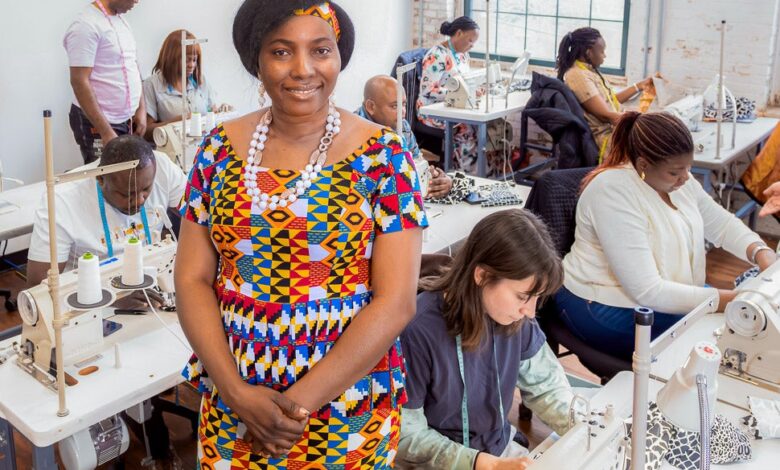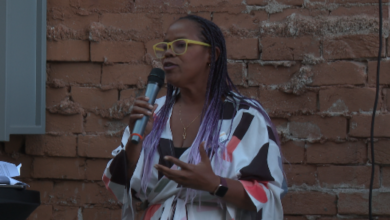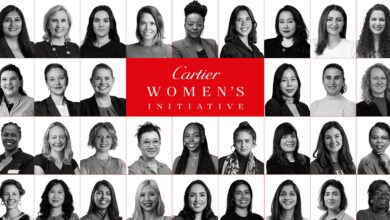Breaking barriers: Women entrepreneurs from diverse backgrounds get a boost in Maine

Radiant in a long red cotton dress with a matching head wrap, Apphia Kamanda Mpay is a walking advertisement for her home-based fashion business. It took her a mere 90 minutes to make the dress, which she designed and embellished with a white lace collar.
The Congolese native, who recently became a U.S. citizen, runs Apphia Mode & Style out of her Westbrook home.
But she spends most of her time teaching fellow immigrants how to sew at Common Threads of Maine, a nonprofit school where she herself trained in 2015 and now helps run as co-executive director.
Mpay’s side hustle is helping clients “dress to impress,” in bespoke garb that makes a statement like the outfit she has on today.
“In my country, people just love dressing up,” the 40-year-old says in a classroom on the third floor of Westbrook’s Dana Warp Mill equipped with industrial sewing machines and multilingual vocabulary lists. “It’s a culture we call Sapologie,” which embraces respect and tolerance and mixes harmony with aesthetics.
To learn the ways of American business culture, Mpay enrolled in a free program at CEI Women’s Business Center South in Portland for aspiring and early-stage entrepreneurs who identify as Black, Brown, Indigenous or other diverse racial and ethnic backgrounds.
While she started making clothes for clients shortly after immigrating to the United States in 2011, she could only start charging for services as a business after getting her work authorization in 2015.
Fast forward to today, and she’s among 20 graduates of the BIPOC Women’s Business Navigator led by Hong Kong native Grace Mo-Phillips, a long-time business mentor to women from ethnically and socially underserved groups. She hopes to lead a third cohort this fall.
File Photo / Jim Neuger
Grace Mo-Phillips
“They always come up with ideas, but they often don’t know where to start,” says Mo-Phillips, an entrepreneur herself exporting frozen seafood to Asia and Europe. “We wanted to create a space where women of color feel comfortable talking through their ideas.”
While the majority of graduates are foreign-born, non-native English speakers, participants include racially diverse women born in the United States.
Weekly, in-person sessions are conducted in English, combining practical training with peer discussions and games like business-lingo Pictionary to break the ice. Long term, the goal is to help the women break barriers to supporting themselves financially as entrepreneurs — starting out as one-person operations.
That’s a tall order in a state where women own only 41.3% of close to 150,000 small businesses — defined as those with fewer than 500 employees — although they make up 48.9% of workers at those enterprises, according to a November 2023 report by the U.S. Small Business Administration.
And, in a state where more than 90% of the population is white, racial minorities own only 3.4% of small businesses; Hispanic-owned businesses are even rarer, making up only 1.6% of the total.
‘Elevating voices and experiences’
Out of 33.3 million small businesses nationwide, women own 43.4% of the total while racial minorities own 20.4%, an SBA barometer shows.
A separate report, by American Express, shows that while the percentage of women-owned businesses jumped from 4.6% in 1972 to 42% in 2019, women of color account for only half of all female-owned businesses. It also shows a widening disparity between minority and non-minority women.
While businesses owned by minority women saw their average revenue drop from $67,800 in 2014 to $65,800 in 2019, revenue at non-minority women-owned businesses increased from an average of $198,500 to $218,800 over the same period.
One explanation offered by researchers is that as more younger women become entrepreneurs, the entry of smaller, young companies to the mix means lower average revenue figures. However, women in general are also still paid less than men, earning 82 cents for every dollar made by men in 2022, about the same as 20 years earlier, Pew Research Center data show.
Noting an even wider pay gap for women of color, Mo-Phillips blames systemic and structural barriers such as gender bias and discrimination for hindering their access to financial resources.
“Also, cultural norms and expectations still play a significant role in our society where women bear more pressure to prioritize family responsibilities over career aspirations,” she says. Despite those obstacles, she finds the women who’ve gone through the navigator program to be deeply committed to advance professionally through entrepreneurship.
“Our programs are designed to elevate their voices and experiences, provide equitable opportunities for business success and cultivate a culture of respect and support, allowing these remarkable women to flourish,” she says.
Diane Sturgeon, the SBA’s Maine district director, has a front-row seat to some of the obstacles faced by immigrant women launching and leading small enterprises. “Running a business is a daunting task for anyone, but when you add the complexities of being a woman of color and in some cases being new to the area, it can be incredibly overwhelming,” she says.
CEI’s navigator program “not only offers participants an opportunity to learn about the resources in Maine, but almost more importantly, it welcomes them into a community of small business owners who are experiencing similar challenges, so they know they are not alone.”
‘Moving upwards’
CEI’s program — shortened to nine weeks this year from 12 originally — gives an overview of business basics from marketing and branding to pricing and financial management.
Participants also get practice and feedback on their two-minute elevator pitches summarizing their business or, in the case of those who haven’t yet started businesses, what they learned.
“I believe in moving upwards,” Kayla Lewis said in her two-minute presentation at graduation.
A native of St. Louis, the Navy veteran started Upward Consulting LLC to help community members and partners tackle social issues. To build on a contract with the Southern Maine Planning and Development Commission, she founded an enterprise and enrolled in the CEI program to grow her business.
Still consulting for the commission, she also works part-time for the National Digital Equity Center as she maps out her long-term professional path.
“The cool thing about having your own business is yes, there is the yearly fee of $175 and a little bit of paperwork, but this is your passion project — what you believe in, how you see the world. This is what you can give your time to, and one day you can do it fully.”
Eventually, she’d like to complete her master’s in public administration or public health and perhaps establish an institute or nonprofit organization.
“It depends on which avenue will best serve my want to move our society upwards,” says Lewis, who runs her business out of her home in Biddeford. “Although I see myself as a businesswoman, I really see myself as someone who has a vision. I believe that community, and its power, can propel social change.”
Frequently giving two thumbs up when talking about Upward, the gesture — and the word — evolved into a mantra for the group.
“One time I did the two thumbs up to show we’re moving upwards, and for everybody it just became a thing,” she says.
Photo / Tim Greenway
Navy veteran Kayla Lewis runs Upward Consulting LLC from her home in Biddeford. Frequently giving two thumbs up when talking about Upward, the gesture — and the word — evolved into a mantra for the group.
From the program’s first cohort in 2023, Florence Edwards is an entrepreneur partly shaped by the military, having served as a captain in the Army. A graduate of Lake Forest College in Illinois and Howard University in Washington, D.C., she practices nonprofit dentistry at a Catholic Charities Maine clinic in Bath, hosts a podcast for Portland nonprofit Indigo Arts Alliance, and is a budding oyster farmer.
For Edwards, the most valuable part of the CEI program “was knowing that you really need to think about who your customer is, and that’s something I continue to think about a year later.”
She also found it refreshing to be one of only two native English speakers in her group.
“Most of the time when I go to things in Maine,” she says, “I’m usually the only person like me in the room — the only female, the only Black person or openly queer person.” This time, most of her classmates hailed from other countries. which she found fascinating.
As she and her business partner get ready to launch the Indigo Oyster Co. in Yarmouth, Edwards hosts a monthly BIPOC happy hour. And starting later this month at Mo-Phillips’ suggestion, she will lead a new women’s networking group.
“I like to explore humanity one human at a time and share that beauty with other people,” she says. “If I’m half as good as Grace was in leading our cohort, I’ll be pleased.”
‘Better to empower others’
Defying stereotypes about immigrants working mainly in the food industry, women who have graduated from the program are active in a range of professions from accounting to travel.
Khadija El Barkaoui, an Indigenous Moroccan of the Amazigh peoples, started Coelle Travel in 2023 to provide authentic travel and cultural experiences for travelers while creating opportunities for women in tourism and women cooperatives in her northern African homeland.
“I like to describe it as a travel company with both local and global social impact, also known as a social enterprise,” she says. She took part in this year’s navigator program, just after Coelle Travel took four Mainers — women and men — from Maine to Marrakesh on a seven-day journey from the Atlas Mountains to the Draa Valley oasis, sharing meals and conversation with locals along the way and visiting with women in cooperatives making rugs and Argan oil.
“These experiences have a lasting impact, fostering learning for both visitors and locals,” says El Barkaoui, for whom the CEI program also had a lasting impact.
“It’s great to be among people doing the same thing, and feeling that you’re not alone,” she says. She nevertheless is finding it challenging to secure funds to build and sustain her business.
Photo / Tim Greenway
Khadija El Barkaoui, an Indigenous Moroccan of the Amazigh peoples, founded Coelle Travel.
Among program alumni who have not yet started businesses, Mensure Jashari says it remains a long-term dream.
Born in the Balkan country of Kosovo, she enrolled in the navigator program after earning her master’s in education from the University of Southern Maine last December.
Jashari, who may start a café someday with her husband, is applying some of the lessons from the CEI program in her new job, as a multilingual teacher at Gorham Middle School.
“When you do business you always have to communicate with your customers and with your partners,” says Mensure, who is fluent in Albanian and English. She also aims to improve her French and Spanish, the languages spoken by her students, and learn Portuguese.
“In my environment as a teacher, I need to be in direct contact with other teachers as well as administrators and students, so that’s a skill I can apply in other fields,” she says.
Back at the Common Threads sewing school in Westbrook, Mpay says she’s now pushing herself to market her business on social media after going through the CEI program and hopes to have her own studio one day as she did in Kinshasa. For now, her priority is teaching sewing to fellow immigrants, some of whom also have entrepeneurial ambitions.
“I don’t really have enough time for my business,” she says, “but it’s better to empower others.”
Photo / Tim Greenway
Congolese native Apphia Kamanda Mpay, center, is a fashion designer and stylist who also teaches at Common Threads of Maine in Westbrook.



